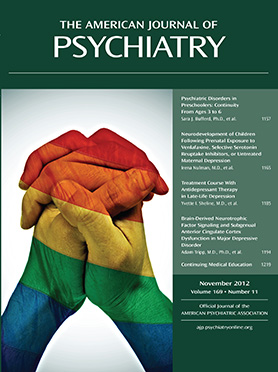Psychopathology in Adolescent Offspring of Parents With Panic Disorder, Major Depression, or Both: A 10-Year Follow-Up
Abstract
Objective
The authors examined the specificity and course of psychiatric disorders from early childhood through adolescence in offspring of parents with confirmed panic disorder and major depressive disorder.
Method
The authors examined rates of psychiatric disorders at 10-year-follow-up (mean age, 14 years) in four groups: offspring of referred parents with panic and depression (N=137), offspring of referred parents with panic without depression (N=26), offspring of referred parents with depression without panic (N=48), and offspring of nonreferred parents with neither disorder (N=80). Follow-up assessments relied on structured interviews with the adolescents and their mothers; diagnoses were rated present if endorsed by either.
Results
Parental panic disorder, independently of parental depression, predicted lifetime rates in offspring of multiple anxiety disorders, panic disorder, agoraphobia, social phobia, and obsessive-compulsive disorder. Parental depression independently predicted offspring bipolar, drug use, and disruptive behavior disorders. Parental panic and depression interacted to predict specific phobia and major depressive disorder. Phobias were elevated in all at-risk groups, and depression was elevated in both offspring groups of parents with depression (with or without panic disorder), with the highest rates in the offspring of parents with depression only. Parental depression independently predicted new onset of depression, parental panic disorder independently predicted new onset of social phobia, and the two interacted to predict new onset of specific phobia and generalized anxiety disorder.
Conclusions
At-risk offspring continue to develop new disorders as they progress through adolescence. These results support the need to screen and monitor the offspring of adults presenting for treatment of panic disorder or major depressive disorder.



